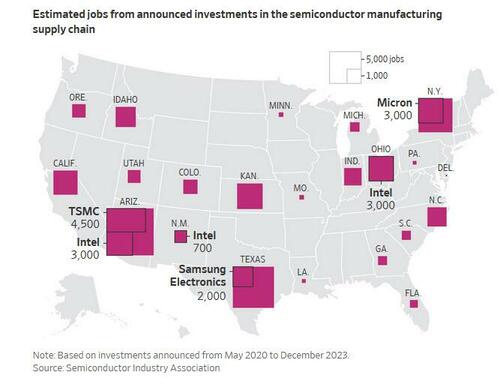Biden To Announce Billions In New Chip Subsidies
Two years after Biden's $53BN CHIPS act did nothing at all to boost the US semiconductor industry - which has instead enjoyed a hope and hype-driven supercycle thanks to the general public's relentless and erroneous fawning over chatbots and AI which, if successful, will leave hundreds of millions unemployed - here comes the president with the inevitable double down.
According to the WSJ, the Biden administration is expected to soon award billions of dollars in new subsidies to Intel, Taiwan Semiconductor and other top semiconductor companies to help build new factories, as part of a push to highlight the administration's "signature economic initiative" as elections approach.
 Intel CEO Pat Gelsinger holds a semiconductor chip during a Senate hearing in 2022; Photo: Zuma Press
Intel CEO Pat Gelsinger holds a semiconductor chip during a Senate hearing in 2022; Photo: Zuma Press
The grants are part of the $53 billion Chips Act, which intended to reshore production of advanced microchips and fend off China, which is fast developing its own chip industry. However, as noted above, the 2022 bipartisan law has seen virtually no uptake, leaving many frustrated with the slow pace of implementation. While more than 170 firms have applied, to date just two tiny grants have been made, to makers of less advanced chips.
So in what will come as long-overdue good news to long-suffering shareholders of companies like Intel which has gotten crushed while foreign peers such as Taiwan Semi and ASML have flourished, industry executives familiar with negotiations said the forthcoming announcements "are for much larger sums, in the billions of dollars," and aimed to kick-start manufacturing of advanced semiconductors that power smartphones, artificial intelligence and weapons systems.
The executives expect some announcements to come before the State of the Union address scheduled for March 7, when President Biden, will seek to showcase his economic achievements as the presidential campaign picks up steam.
“There is pressure obviously to get the big names funded before things start really heating up,” said William Rinehart, a senior fellow for technology and innovation for the American Enterprise Institute, a think tank.
The announcements are preliminary, to be followed by due diligence and then final agreements. Funds will be released in stages as the projects progress.
Some lawmakers and industry officials worry that, because of permitting and other delays, it could be years before the taxpayer-subsidized factories are churning out made-in-America chips.
Among the likely beneficiaries and funding recipients is Intel, which is led by CEO Pat Gelsinger and has projects under way in Arizona, Ohio, New Mexico and Oregon that will cost more than $43.5 billion. Another is TSMC, with two fabrication plants, or fabs, under construction near Phoenix for a total investment of $40 billion. Arizona and Ohio are considered battleground states in November’s presidential and congressional races.
South Korea’s Samsung Electronics has a $17.3 billion project near Dallas. Micron Technology, Texas Instruments and GlobalFoundries count among other top contenders, industry executives say.
“Certainly, in the early part of this year, we will be announcing major progress,” Michael Schmidt, director of the Chips Program Office, said. “We are on schedule.”
A Commerce Department spokeswoman declined to discuss individual applications, timing or award amounts. “This is a merit-based process with tough commercial negotiations—CHIPS awards will be entirely dependent upon which projects will advance U.S. economic and national security,” she said.
The Chips Act includes $39 billion in manufacturing grants to cover as much as 15% of the total cost of each project up to $3 billion per fab, as well as loans, loan guarantees and tax credits.
To be sure, how the Chips Act is implemented will make for an early test of Washington’s ability to carry out industrial policy— government support for industries deemed strategic — where China, Japan and Germany have far more practice. Naturally, delivering on signature economic policies, such as the Chips Act, a 2021 infrastructure law and the 2022 Inflation Reduction Act which targets renewable energy, is also urgent for Biden’s re-election push considering his substantial popularity deficit behind Trump in the polls.
Despite the general popularity of such stimulus boondoggles, voters overall have a dim view of Biden’s economic stewardship. A December poll by The Wall Street Journal found “Bidenomics,” the collective moniker for such programs, is viewed favorably by less than 30% of voters and unfavorably by more than half.
Part of the gap might lie in how long it has taken to actually implement the laws. The Chips Act’s requirements on workforce and national security have complicated the funding negotiations. Shortages of skilled workers loom.
Meanwhile, TSMC, which produces roughly 90% of the world’s most advanced chips, said last week it expected to delay production at the second of its Arizona plants by one to two years, citing uncertainty over U.S. incentives. TSMC had earlier postponed the opening of the first fab from 2024 to the first half of 2025.
“The main reason is the lead time and the alternatives that these firms have,” said John VerWey, an adviser on security and technology at the federal Pacific Northwest National Laboratory who has studied regulatory hurdles for plant constructions in the U.S. “When TSMC wants to build a fab in Taiwan or in Japan, they can do so much faster than they can in the U.S.”
A shortage of skilled workers has also been cited as a reason for potential delays. The Semiconductor Industry Association, a trade group, estimates the industry will face a shortfall of 67,000 workers by 2030, including technicians, computer scientists and engineers.
“The chip industry is capital-intensive and, as such, firms need predictability,” said Jimmy Goodrich, a semiconductor expert advising Rand Corp. “They will hedge significant investments such as purchasing equipment, which accounts for 80% of fab costs, until they are certain that there is market demand and that government incentives will be in place at the level needed to compete globally."

Comments
Post a Comment